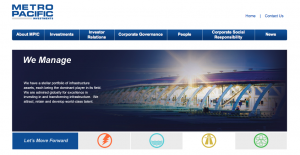TOKYO—Billions of pesos worth of capital spending—funds that could help boost the Philippine economy—are being held up by various regulatory roadblocks faced by Metro Pacific Investments Corp.’s (MPIC) operating units.
As such, officials of the Manuel Pangilinan-led infrastructure and utilities conglomerate are urging the administration of President Aquino to act faster on several tariff increase petitions and project approvals pending with government agencies.
“We’re making a lot of noise about the tariffs [increases] being implemented for practical reasons,” MPIC president and CEO Jose Ma. Lim said, explaining that higher fees for Metro Pacific Tollways Corp., Maynilad Water Services Inc. or the conglomerate’s joint venture to run the Light Rail Transit Corp. were crucial for service improvements.
“It would be very difficult to get the funding necessary for LRT-1 without getting the baseline fares [increased],” he explained.
MPIC has set out to spend as much as P53.7 billion next year to boost operations at its various units like the Manila Electric Co., MPTC, Maynilad, the joint venture with the Ayala group on the LRT line 1 extension, as well as its hospital investment arm.
Setback
However, billions more—especially for new tollroad projects and service improvement programs for the water concession in the western side of Metro Manila—have been put on the back burner pending clearer policy direction from government regulators.
Meralco’s early foray into this field suffered a setback after the courts ordered a halt to the construction of a 600-megawatt coal plant in Subic due to environmental issues.
Maynilad has an ongoing dispute with water industry regulators who ordered it to cut tariffs last year amid the company’s petition to raise them for needed expansion programs.
MPTC, meanwhile, has yet to receive approval for its revenue-sharing deal for the Subic-Clark-Tarlac Expressway despite having already improved its offer to the government thrice. It also has pending applications for tariff increases on two major tollroads that the government has yet to act on.
Finally, the group’s LRT-1 extension joint venture also needs regulatory approval for higher fares for the project to be financially viable.
MPIC has since ramped up its investments in information technology and automation to help mitigate the impact of the regulatory roadblocks that prevent a more aggressive expansion into new revenue streams.
Lim said that the strategy of spending more on technology that monitors customer usage of water, electricity, traffic volume in tollways and even personal medical records was meant, in part, to drive additional volume of use by MPIC’s clients.
Passion
Nonetheless, MPIC chief financial officer David Nicol stressed that the conglomerate was “passionate” about improving efficiency while helping boost bottom lines amid regulatory restrictions faced by several key units.
“There’s one level where you’ve got regulatory noise that’s interfering and causing problems with financing and investors,” he said. “But on another level, you have operational managers saying ‘we will make this as efficient as we can, and get on with it.’”
MPTC president Ramoncito Fernandez pointed out that the various operating units continued to make headway in improving efficiencies with the help of automation and new technologies.
“Because of the tariff [approval] delays, our quest to be more efficient has been more seriously driven,” he said. “But we cannot continuously squeeze the operating efficiency area. By next year, we will have squeezed out efficiencies to the hilt. We need the tariff increases.”
Lim pointed out that all concessionaires around the world faced this kind of regulatory risk, but “in the worst cases, the risks become real, and we see it happening here as well.”
“You may have what appears to be higher risk because of perceived delays in the implementation of tariff [adjustments], which is usually a function of political considerations,” the MPIC chief said.
